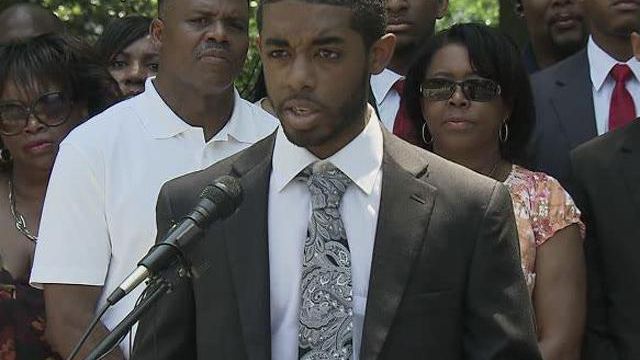Bar manager served criminal summons over discrimination claim
A Raleigh man who claims he was physically removed from a downtown bar because he is black has filed a complaint against one of the bar's employees.
Posted — UpdatedThe criminal summons, issued on June 22, was served Tuesday against Todd Chriscoe, who manages The Downtown Sports Bar and Grill on Glenwood Avenue.
In the paperwork, Jonathan Wall, 21, accuses Chriscoe, 47, of simple assault and ethnic intimidation. Wall says Chriscoe grabbed his wrists, put them behind his neck, forced him out of the bar and pushed him to the ground.
The criminal summons is based on Wall's accusations before a magistrate and not a police investigation. Raleigh police say they are not investigating the matter because Wall declined to file a police report after speaking with a police sergeant who was on foot in the area.
A hearing in Wake County District Court has been set for July 23.
Wall's attorney, Alesia Vick, said at a news conference last week that Chriscoe confronted Wall in the early hours of June 17 and told him he would have to buy a drink or leave.
When Wall explained that he was waiting on a friend, Vick said, Chriscoe put him in a headlock and forced him out of the bar.
She said there were no other black customers in that part of the bar.
William Potter, an attorney for The Downtown Sports Bar and Grill, has said that Wall was not improperly treated and that he was thrown out of the bar because he was not a member.
Potter has insisted that race had nothing to do with the matter.
Still, Wall's story has prompted numerous other people who are black to come forward, saying they were also treated differently at The Downtown Sports Bar and Grill.
A rally being called "Above It All: A Raleigh Stand Against Social Injustice" is planned for noon to 4 p.m. Saturday at Moore Square, 200 S. Blount St.
Accusations of discrimination aren't new for Chriscoe.
In 2001, he co-owned a private club called The Office in downtown Raleigh. The club's strict dress code that prohibited styles of clothing popular among black people.
Chriscoe said back then that the matter had nothing to do with race but had more to do with creating an upscale environment and ensuring that patrons of the club felt comfortable.
• Credits
Copyright 2024 by Capitol Broadcasting Company. All rights reserved. This material may not be published, broadcast, rewritten or redistributed.






